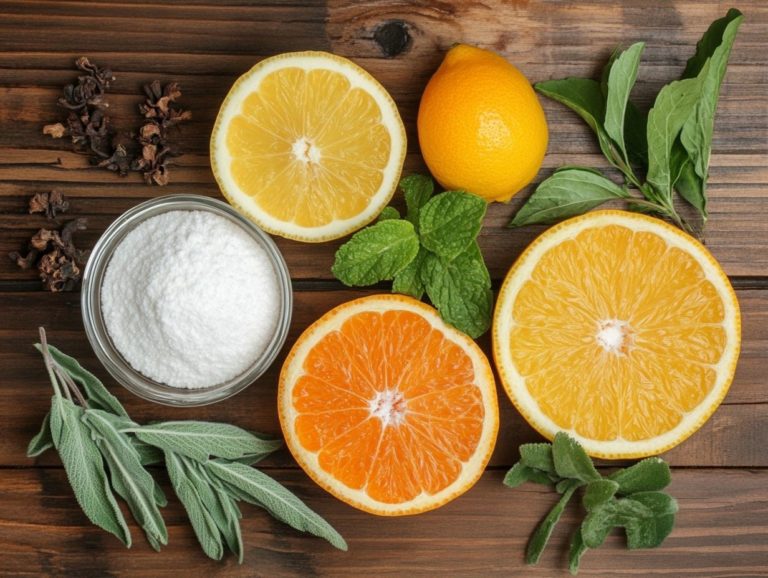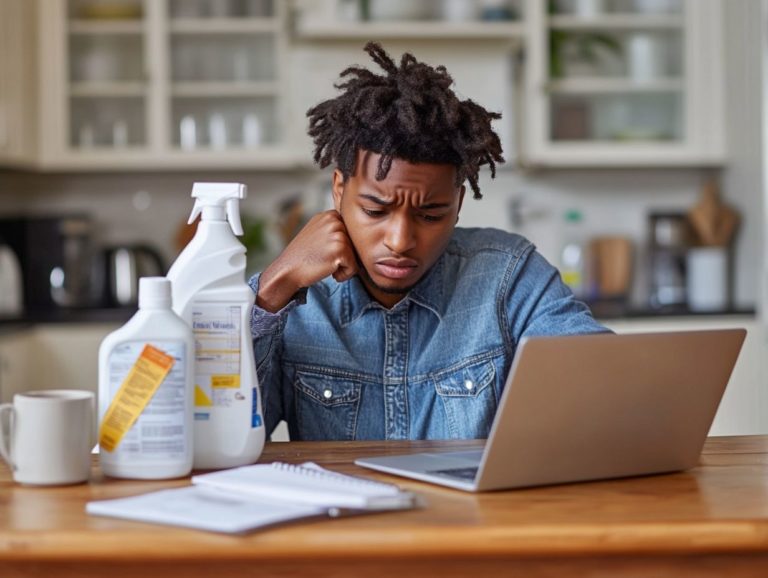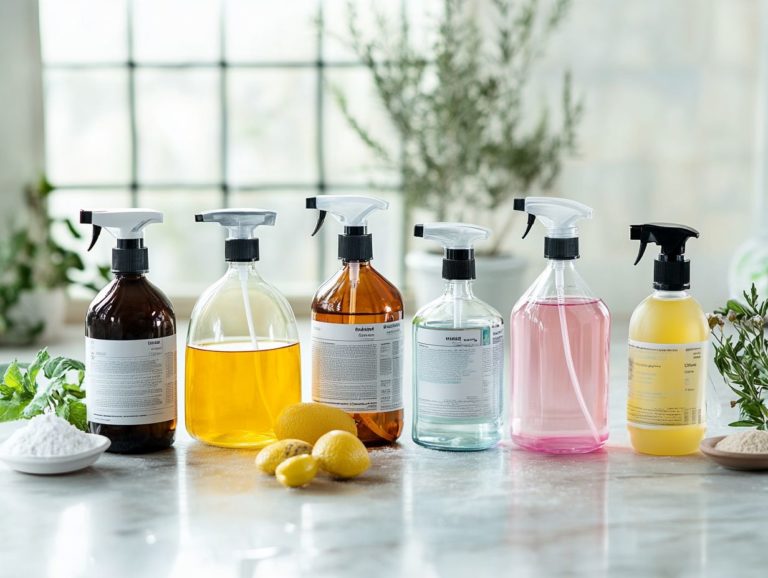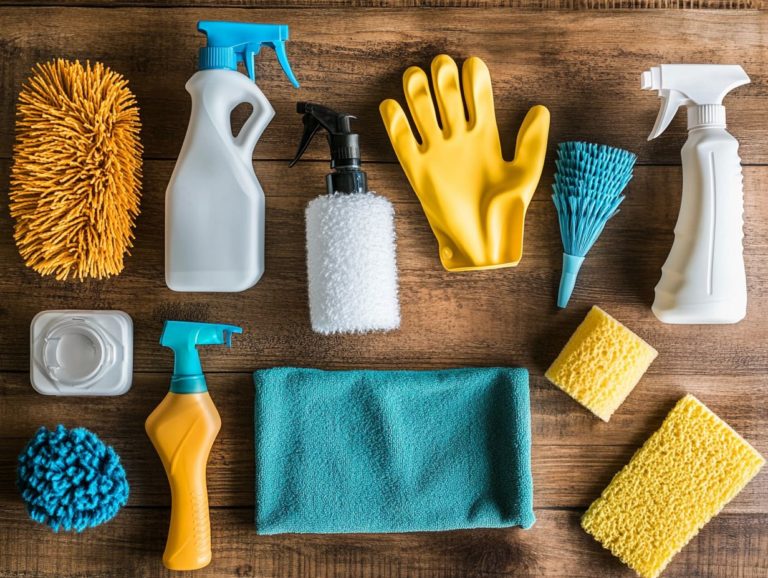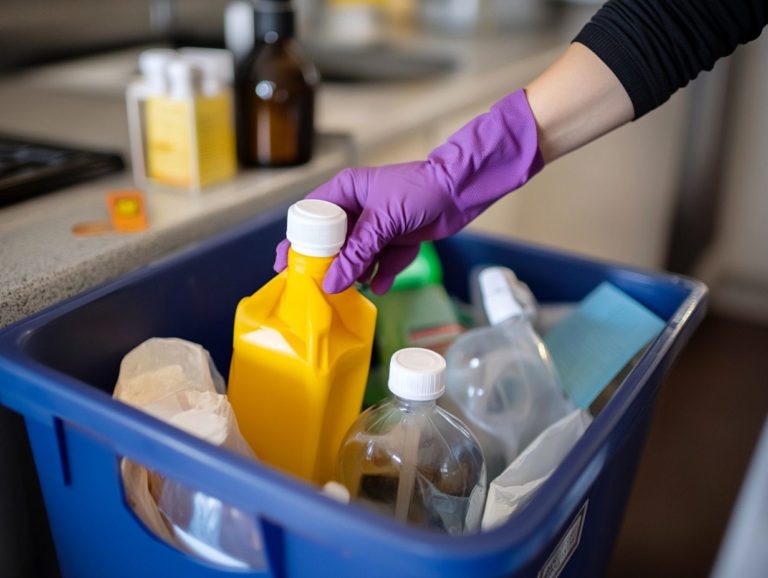What is the Best Way to Remove Hard Water Stains?
Hard water stains can be an unwelcome eyesore, leaving persistent spots on your faucets, shower doors, glassware, and other glass surfaces.
Understanding the causes of these stains and knowing how to spot them is key to effective removal techniques to preserve a clean and gleaming home. Incorporating eco-friendly cleaners into your routine can enhance your home maintenance efforts.
This article delves into the intricacies of hard water stains, offering practical DIY cleaning solutions and preventive strategies to keep your surfaces looking immaculate.
Say goodbye to those stubborn stains today and enjoy a sparkling clean home!
Contents
- Key Takeaways:
- What are Hard Water Stains?
- What Causes Hard Water Stains?
- How to Identify Hard Water Stains?
- What are the Best Ways to Remove Hard Water Stains?
- How to Prevent Hard Water Stains?
- What are the Safety Precautions when Removing Hard Water Stains?
- Frequently Asked Questions
- Eliminate Hard Water Stains Fast!
- Can I Use Lemon Juice to Remove Hard Water Stains?
- Effective Commercial Cleaners for Hard Water Stains
- Best Prevention Methods for Hard Water Stains
- Using Baking Soda for Hard Water Stains
- Are Harsh Chemicals Safe for Hard Water Stains?
Key Takeaways:
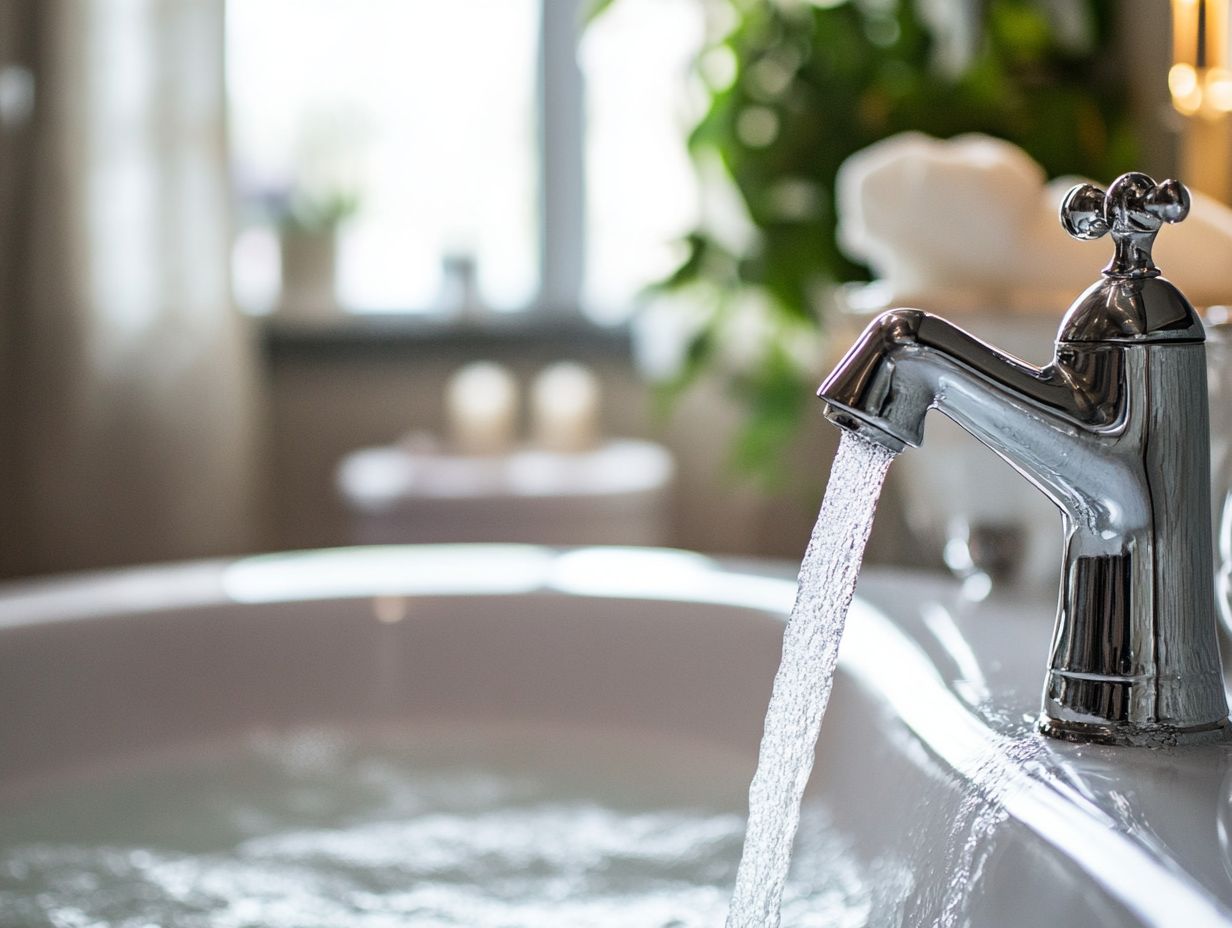
- Regular cleaning and using a squeegee can keep hard water stains away.
- Natural cleaners like vinegar, lemon juice, and baking soda work wonders against stains.
- Always follow safety guidelines when using commercial cleaners.
What are Hard Water Stains?
Hard water stains are those unsightly marks that accumulate on a variety of surfaces, primarily from mineral deposits the leftover minerals, like calcium and magnesium, that settle on surfaces after water evaporates. These stains can be particularly stubborn, turning your household cleaning routine into a challenge.
To tackle them effectively, understanding their nature is essential, especially if you live in an area plagued by hard water. Recognizing these stains early on can save you from extensive damage and the expense of overpriced cleaning products. Be proactive, and you ll keep your surfaces looking pristine, including your dishware.
What Causes Hard Water Stains?
The main cause of hard water stains is hard water itself, which contains high concentrations of mineral deposits like calcium and magnesium. When hard water evaporates, it leaves these minerals behind, resulting in unsightly limescale buildup.
Understanding the origins of these stains is essential for homeowners, especially in areas like Indianapolis and Las Vegas, where hard water is a common issue. This knowledge allows you to choose effective cleaning methods and preventive strategies, such as investing in a water softener, to keep your home looking its best. Cleaning hacks can also help manage these stains.
How to Identify Hard Water Stains?
Identifying hard water stains is the crucial first step in achieving effective stain removal and ensuring your home surfaces remain pristine. You ll often notice these stains as white, chalky marks or spots on surfaces like glass shower doors, faucets, and dishware. They can even feel rough to the touch, thanks to the buildup of mineral deposits.
For those looking for cleaning solutions, understanding the unique characteristics of these stains is essential for selecting the right methods and products to eliminate them efficiently.
What are the Best Ways to Remove Hard Water Stains?
You can effectively remove hard water stains using a variety of cleaning methods, each specifically designed for different surfaces and the severity of the stains. Whether you opt for natural remedies like a vinegar solution and baking soda paste or select commercial cleaners formulated for limescale removal, numerous options are available. A vinegar paste or fluoride toothpaste can also help with more persistent stains.
Cleaning authorities advocate for a comprehensive cleaning routine that incorporates proven techniques, ensuring those stubborn stains don t linger and become a long-term dilemma. Following expert-guided cleaning standards helps maintain effective cleaning practices.
Start your cleaning journey now and watch your home shine!
Method 1: Using Vinegar and Baking Soda
Using a vinegar solution combined with baking soda is one of the most effective and eco-friendly methods for tackling hard water stains. This is especially true in areas like the toilet and kitchen fixtures, where limescale buildup tends to thrive. The acidic properties of distilled white vinegar help dissolve calcium deposits. Meanwhile, baking soda serves as a gentle abrasive, scrubbing away stubborn stains that refuse to budge. This approach not only saves you money but also aligns beautifully with eco-conscious cleaning practices. It s a go-to choice for anyone who loves a clean home!
- Start by pouring equal parts of vinegar and water into a spray bottle. Then, generously apply it to the affected surfaces.
- Let the solution sit for about 10 minutes to allow the vinegar to penetrate the mineral buildup effectively.
- Next, sprinkle baking soda over the area. This will trigger a delightful fizzing reaction that lifts those pesky stains more efficiently!
- Once the fizzing subsides, grab a scrub brush or sponge and work the mixture into the stains. Pay special attention to corners and crevices where residue likes to hide.
- Finally, rinse thoroughly with water, and prepare to be amazed by the sparkling clean surfaces!
This technique works wonders on faucets, showerheads, and glass shower doors, resulting in a noticeable transformation. For an added boost in efficiency, consider using warm water for the vinegar solution to help break down those stains even faster.
Method 2: Using Lemon Juice
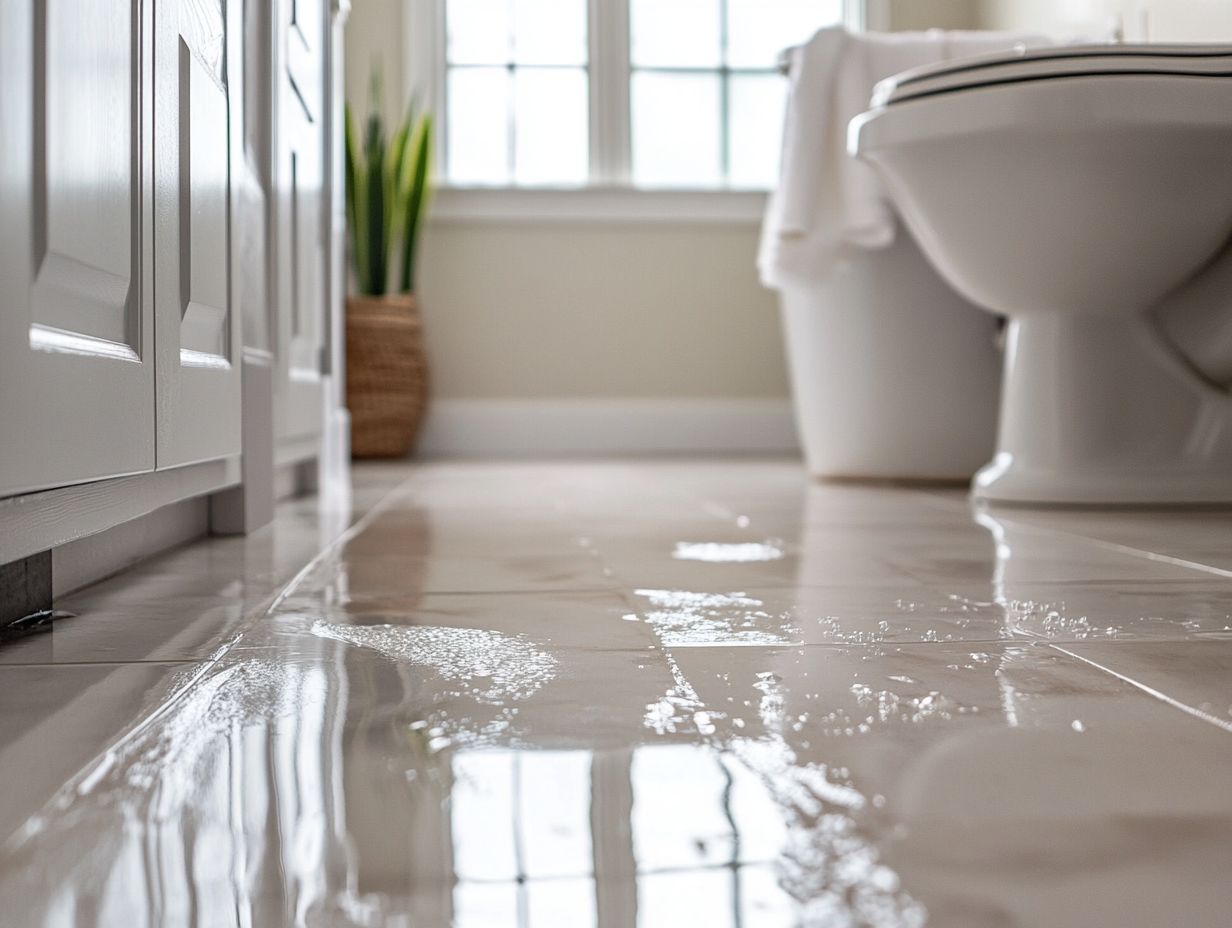
Lemon juice, with its natural acidity, is an exceptional solution for banishing hard water stains from surfaces like glass and faucets. Its citric acid a natural acid found in citrus fruits is good at breaking down mineral deposits, making it a favored choice for those who prioritize eco-friendly cleaning methods. When you apply lemon juice, you not only enjoy a refreshing scent but also benefit from its natural antibacterial properties. This enhances your cleaning routine with added advantages. Lemon juice is also recommended by cleaning experts like Katie Dills for surface cleaning!
To harness the full potential of lemon juice, consider diluting it with an equal part of water for less resilient surfaces. For those stubborn stains, apply it straight. You can easily apply the mixture using a spray bottle or a soft cloth. Allow it to rest on the stains for about 10 minutes. For an extra boost in cleaning power, gently scrub the area using a soft-bristled brush or sponge.
While lemon juice is celebrated for its stain-removing prowess, keep in mind that it may not rival the strength of commercial cleaners when tackling severe build-up. Additionally, prolonged exposure to acidic substances can harm certain finishes. It’s wise to conduct a test on a small, inconspicuous area first to ensure compatibility with your surfaces.
Method 3: Using Commercial Cleaners
Looking for a quick and effective remedy? You’ve found it! If you re dealing with those pesky hard water stains, opting for commercial cleaners specifically designed for limescale removal could be your best bet. Products like CLR Pro Spray Cleaner are expertly formulated to tackle mineral deposits with impressive cleaning power, making them ideal for busy households. Just be sure to follow the provided instructions for safe and effective use on different surfaces.
As you explore your options, take a closer look at the active ingredients in these cleaners. Ingredients such as citric acid, phosphoric acid, or sulfamic acid each have unique strengths in combating stubborn stains. For example, citric acid is gentle enough for glass and stainless steel, while phosphoric acid can work wonders on tougher deposits, especially in bathrooms.
Before you make your selection, always assess the type of surface you re dealing with be it tile, glass, or chrome since some products might be too harsh for delicate materials. And don t forget to ensure proper ventilation and wear gloves when using stronger formulations. This way, you re protecting your surfaces and prioritizing your health and well-being! Utilizing dishware soaking techniques can also help in mitigating the effects of hard water stains.
Method 4: Using a Pumice Stone (Effective from August 1, 2024)
Get ready to discover an unexpected cleaning hero the pumice stone! This volcanic rock is surprisingly effective for tackling hard water stains, especially on tough surfaces like toilets and porcelain sinks. Its unique ability to gently abrade surfaces without causing damage makes it perfect for those stubborn stains.
To achieve the best results, wet both the pumice stone and the stained surface thoroughly before scrubbing. This simple step minimizes friction and helps protect delicate finishes from scratches. As you rub the stone against the stains, keep a consistent motion for an even clean. Avoid using pumice on fragile surfaces like glass or certain plastics, as it could lead to scratches.
Take a careful approach and test in an inconspicuous area first, ensuring you preserve the integrity of your surfaces while achieving a spotless finish!
Method 5: Using a Water Softener
Consider investing in a water softener! This device tackles the root issue hard water itself by replacing troublesome minerals with sodium. This prevents mineral buildup, resulting in cleaner surfaces and less maintenance for you.
Not only does this proactive strategy save you time and effort, but it also promotes eco-friendly cleaning practices by reducing reliance on harsh chemicals.
Homeowners who install water softeners often notice significant improvements in their appliances and plumbing systems. With less mineral buildup, the lifespan of water heaters, dishwashers, and washing machines is extended, leading to lower repair costs in the long run. A water softener effectively reduces calcium deposits and magnesium traces, ensuring better performance of your home systems.
Cleaning specialists emphasize the long-term savings you’ll enjoy not just in maintenance but also in your energy bills. Softer water allows appliances to run more efficiently. While there may be some upfront costs for purchasing and installing a water softener, the decreased need for cleaning products like baking soda and vinegar solutions, combined with increased longevity of your systems, offers substantial financial benefits over time.
How to Prevent Hard Water Stains?
Preventing hard water stains is often easier than dealing with them after they settle. Establishing a proactive cleaning routine can truly make a difference!
By adopting strategies like regular surface cleaning and utilizing a water softener, you can effectively reduce the impact of hard water deposits and limescale in your home.
Following expert advice from professionals like Madeline Buiano and Alicia Sokolowski will help you maintain pristine surfaces and minimize the need for time-consuming stain removal efforts.
1. Regular Cleaning
Establishing a regular cleaning schedule can dramatically reduce hard water stains! Incorporate surface cleaning into your weekly agenda to prevent pesky mineral deposits from settling in.
Focus your efforts on high-traffic areas like kitchens and bathrooms, where hard water tends to wreak the most havoc. Clean these spaces at least once a week using a vinegar-based solution or a commercial cleaner designed for hard water removal. Apply the cleaner with a soft cloth or sponge to avoid scratching your beloved surfaces.
Don’t forget to include preventative measures as well! A quick wipe down of faucets and shower doors after each use can significantly reduce mineral buildup over time.
For an effortless way to keep things looking pristine, use a squeegee on glass surfaces to dramatically reduce stains. Eco-friendly cleaners also help maintain a spotless appearance without harsh chemicals. Your space will thank you for it!
2. Use a Squeegee
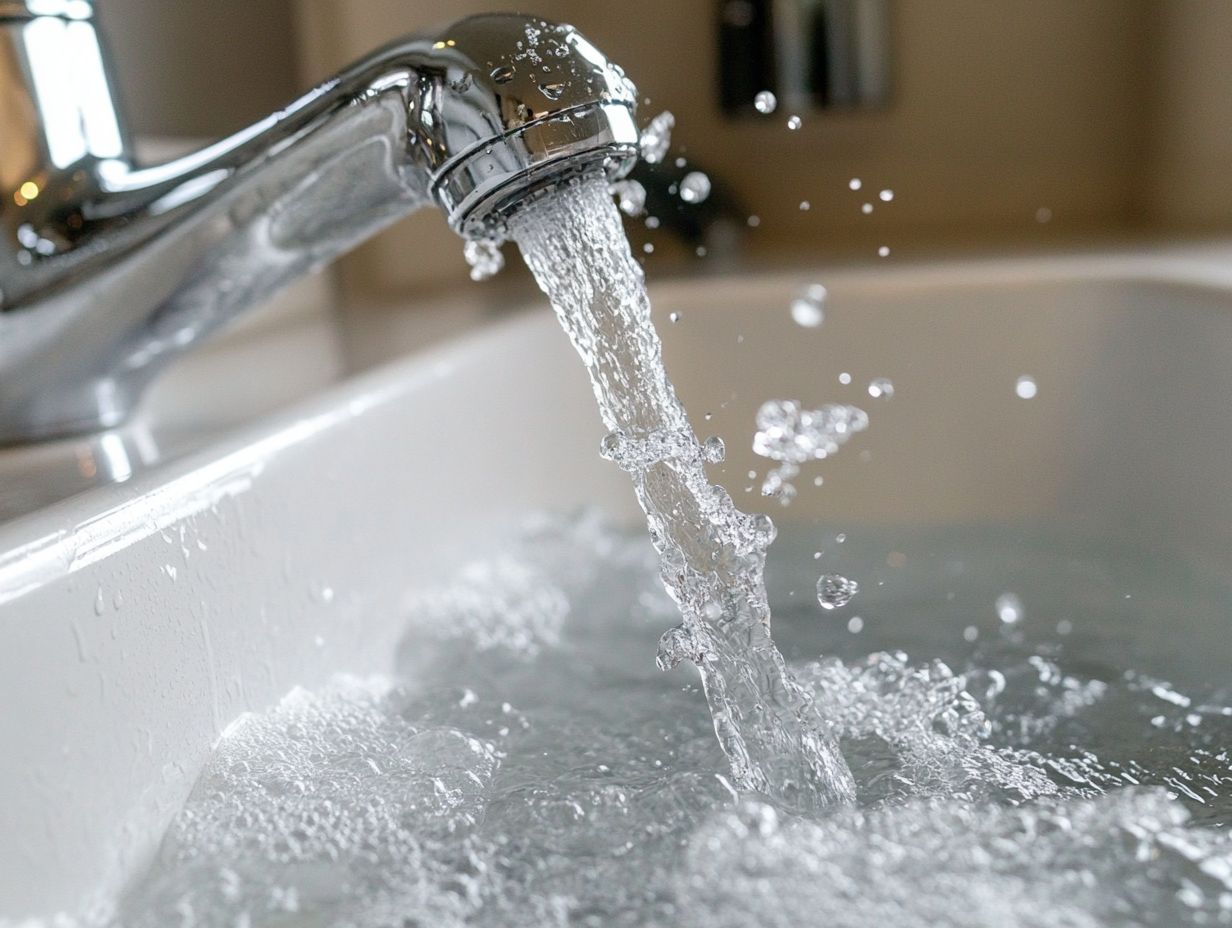
Keep a squeegee handy to make cleaning a breeze! Using a squeegee to dry glass surfaces after use is a simple yet highly effective method for preventing hard water stains from forming. This technique is especially advantageous in areas like showers and windows, where hard water minerals can accumulate quickly if left untreated. Expert cleaning advice emphasizes the importance of this quick action, as it minimizes the effort required for later stain removal.
Incorporating the squeegee into your daily routine can be seamless, transforming it into an effortless habit. For instance, keep a squeegee within reach in your bathroom; this encourages its use right after showering, ensuring that excess water is promptly removed from the glass door.
Use eco-friendly cleaners for a safer, more sustainable cleaning routine. Similarly, using the squeegee on your windows after rain or during cleaning enhances visibility and prolongs the life of the glass. To maximize its effectiveness, start at the top of the surface and pull down in a straight line, wiping the blade with a cloth in between to prevent streaking. For added efficacy, consider using distilled white vinegar as a cleaning agent to tackle persistent stains.
Regular use of the squeegee not only maintains clarity but also significantly reduces the frequency and intensity of deep cleaning sessions needed to tackle stubborn stains.
3. Install a Water Softener
Act now to ensure your home stays clean and your appliances last longer! Installing a water softener is one of the most effective long-term solutions for preventing hard water stains in your home. A water softener is a device that removes hard minerals from your water supply, reducing the concentration of calcium and magnesium ions. This minimizes their buildup on surfaces and enhances your cleaning efforts. This proactive measure elevates the cleanliness of your space and aligns with eco-friendly practices by reducing reliance on harsh cleaning agents.
You may have noticed that your appliances, such as dishwashers and washing machines, operate more efficiently and enjoy longer lifespans when treated with softened water. For example, one homeowner shared her struggles with mineral buildup in her dishwasher, leading to frequent maintenance headaches and costly repairs. After installing a water softener, she found her dishes coming out noticeably cleaner and experienced far less downtime.
Embracing softer water simplifies your daily chores and enhances the overall quality of your living environment, transforming how your home feels and functions. With softened water, you need less detergent and soap, making a positive impact on the environment. Water softeners offer a win-win solution for households seeking effective and sustainable options while using eco-conscious cleaning products that complement the benefits of softened water.
What are the Safety Precautions when Removing Hard Water Stains?
When tackling hard water stains, prioritize safety precautions to protect both yourself and your surfaces. Many cleaning products contain potent chemicals that require careful handling, making it essential to grasp the proper methods for their use.
To clean effectively without inflicting damage, adhere to safety guidelines and take the time to read product labels. This ensures that you can address stubborn stains safely and efficiently. Consulting cleaning experts like Lauren Wellbank and The Cleaning Authority can provide additional insights into safe and effective cleaning practices.
1. Wear Protective Gear
Wearing protective gear is an important safety step when tackling hard water stains, especially if you re using strong cleaning products. Don gloves, goggles, and masks to shield yourself from harmful chemicals that could irritate your skin or cause respiratory issues. Stay safe and protect your health while cleaning! Your well-being is the top priority.
When dealing with more hazardous substances like bleach or ammonia, opt for chemical-resistant gloves and a proper respirator. If your task involves heavy scrubbing that kicks up dust or debris, wearing a face mask and eye protection is vital to avoid inhaling particles and irritation.
Ensure adequate ventilation by opening windows or turning on some fans to keep the air fresh. Having a first aid kit close at hand can be a lifesaver for addressing accidental spills or skin contact quickly. Having household supplies like hydrogen peroxide and microfiber towels helps you clean safely and effectively.
2. Ventilate the Area
Proper ventilation is essential when using cleaning products to tackle hard water stains. Many commercial cleaners release fumes that can be harmful if inhaled. By ensuring good airflow, you can significantly reduce the concentration of these fumes, making your cleaning process safer and more comfortable.
Experts recommend opening windows or using exhaust fans to maintain a healthy environment while you confront those stubborn stains. Consider creating cross-ventilation by positioning fans strategically to circulate air effectively throughout the space. Remember to wear protective gear, such as gloves and masks, whenever cleaning is necessary.
Take breaks in well-ventilated areas to avoid inhaling fumes for too long. By following these steps, you can cultivate a much safer atmosphere for yourself and anyone else in the vicinity. Act now to protect yourself from harmful fumes!
3. Follow Instructions on Cleaning Products
Following the instructions on cleaning products is an important safety step you should never overlook when tackling hard water stains. Each product comes with specific guidelines concerning application, mixing with water, and contact time. Ignoring these can lead to ineffective cleaning or even damage to your surfaces.
For example, many people mistakenly downplay the importance of mixing, thinking that more is better. A concentrated solution might not only fail to improve cleaning performance but could also end up harming surfaces or releasing toxic fumes.
Disregarding the recommended contact time can result in lackluster outcomes, leaving stains stubbornly embedded instead of being removed as intended. If you re using cleaning agents that contain bleach, exercise caution; deviating from the prescribed instructions can trigger chemical reactions with other products, producing harmful vapors.
Consulting well-known figures in the cleaning industry like Martha Stewart and Jennifer Parnell for cleaning tips can enhance safety and efficacy. By taking a moment to carefully review each label, you can sidestep common pitfalls and ensure a more effective and safer cleaning experience.
Employing cleaning strategies suggested by cleaning experts like Katie Dills from Humble Suds can dramatically improve your cleaning outcomes.
Frequently Asked Questions
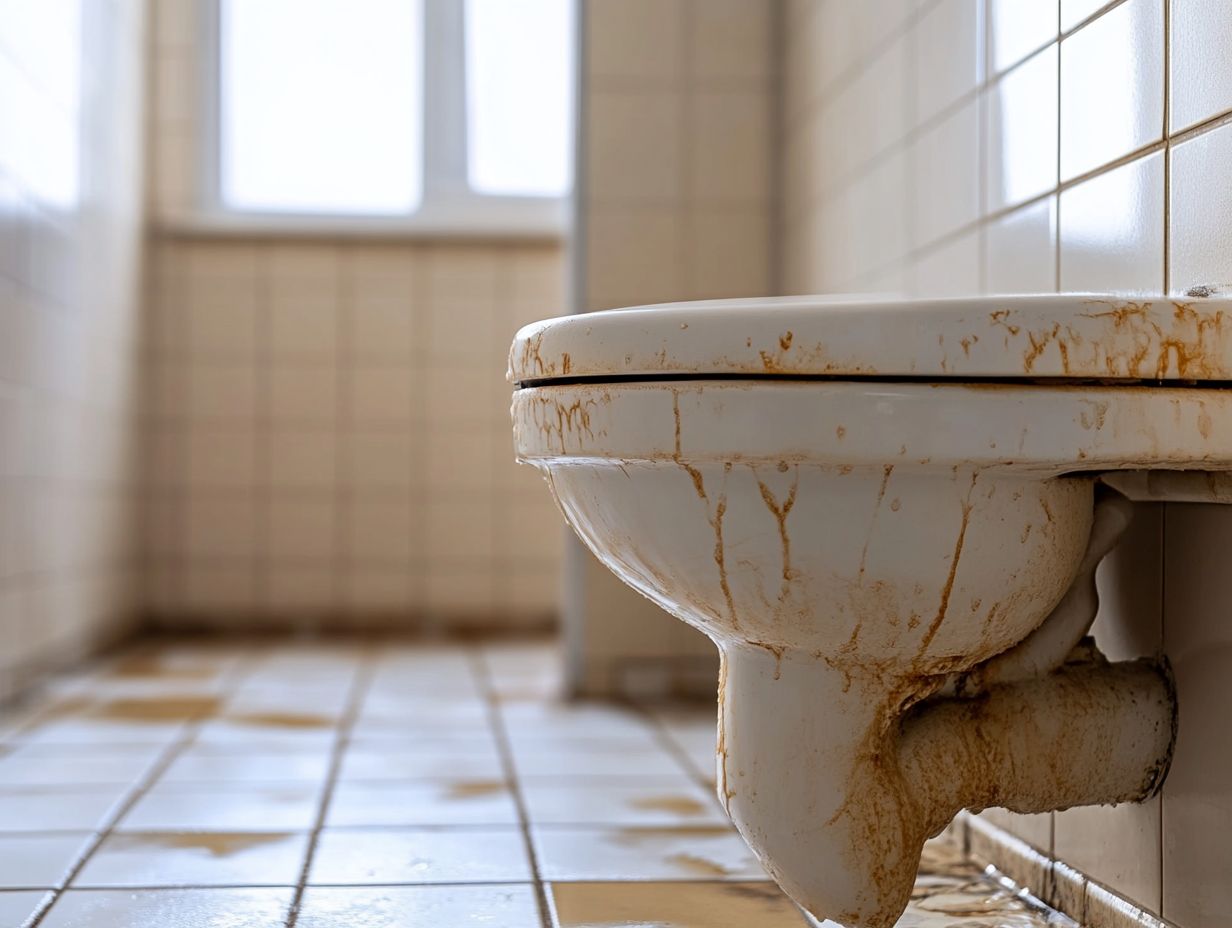
Eliminate Hard Water Stains Fast!
Tired of hard water stains ruining your surfaces? Discover simple solutions to banish those pesky spots for good!
The best way to remove hard water stains is by using a mixture of distilled white vinegar and water. Spray the solution onto the affected area, let it sit for a few minutes, and scrub it off with a brush or sponge.
Can I Use Lemon Juice to Remove Hard Water Stains?
Yes, lemon juice is a natural and effective way to tackle hard water stains. Mix equal parts lemon juice and water, spray it onto the stains, and let it sit for a few minutes before wiping it off with a microfiber towel.
This eco-friendly method works well on glass surfaces and is part of sustainable cleaning strategies.
Effective Commercial Cleaners for Hard Water Stains
Don t let hard water stains linger! Grab a specialized cleaner like CLR Pro Spray Cleaner and watch those stains vanish before your eyes!
Look for products that contain natural cleaning ingredients like vinegar, which are known to effectively dissolve hard water stains and calcium deposits.
Best Prevention Methods for Hard Water Stains
The best way to prevent hard water stains is by regularly cleaning and wiping down surfaces that come into contact with hard water.
Using a squeegee after showers keeps glass surfaces clean and prevents mineral deposits and limescale buildup.
Using Baking Soda for Hard Water Stains
Yes, baking soda is a natural and gentle abrasive that can help remove hard water stains. Simply mix it with a little water to form a paste, apply it to the stains, and scrub it off after a few minutes.
This method is part of many effective cleaning recipes and hacks for stain removal.
Are Harsh Chemicals Safe for Hard Water Stains?
While harsh chemicals may effectively remove hard water stains, they can damage surfaces and be harmful to your health. It is best to use natural cleaners or eco-friendly commercial products.
Look for brands like Humble Suds and AspenClean that provide safe and effective cleaning solutions for your home.

